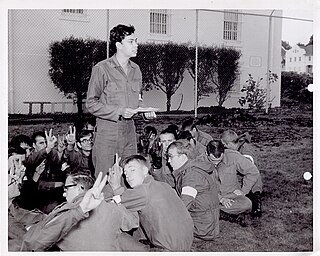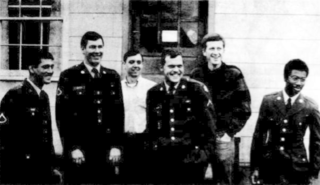Contempt of court, often referred to simply as "contempt", is the crime of being disobedient to or disrespectful toward a court of law and its officers in the form of behavior that opposes or defies the authority, justice, and dignity of the court. A similar attitude toward a legislative body is termed contempt of Parliament or contempt of Congress. The verb for "to commit contempt" is contemn and a person guilty of this is a contemnor or contemner.
A court-martial or court martial is a military court or a trial conducted in such a court. A court-martial is empowered to determine the guilt of members of the armed forces subject to military law, and, if the defendant is found guilty, to decide upon punishment. In addition, courts-martial may be used to try prisoners of war for war crimes. The Geneva Conventions require that POWs who are on trial for war crimes be subject to the same procedures as would be the holding military's own forces. Finally, courts-martial can be convened for other purposes, such as dealing with violations of martial law, and can involve civilian defendants.

Mutiny is a revolt among a group of people to oppose, change, or remove superiors or their orders. The term is commonly used for insubordination by members of the military against an officer or superior, but it can also sometimes mean any type of rebellion against any force. Mutiny does not necessarily need to refer to a military force and can describe a political, economic, or power structure in which subordinates defy superiors.
The Nuremberg principles are a set of guidelines for determining what constitutes a war crime. The document was created by the International Law Commission of the United Nations to codify the legal principles underlying the Nuremberg Trials of Nazi party members following World War II.
Military justice is the body of laws and procedures governing members of the armed forces. Many nation-states have separate and distinct bodies of law that govern the conduct of members of their armed forces. Some states use special judicial and other arrangements to enforce those laws, while others use civilian judicial systems. Legal issues unique to military justice include the preservation of good order and discipline, the legality of orders, and appropriate conduct for members of the military. Some states enable their military justice systems to deal with civil offenses committed by their armed forces in some circumstances.
Dereliction of duty is a specific offense under United States Code Title 10, Section 892, Article 92 and applies to all branches of the US military. A service member who is derelict has willfully refused to perform his duties or has incapacitated himself in such a way that he cannot perform his duties. Such incapacitation includes the person falling asleep while on duty requiring wakefulness, his getting drunk or otherwise intoxicated and consequently being unable to perform his duties, shooting himself and thus being unable to perform any duty, or his vacating his post contrary to regulations.

The Port Chicago disaster was a deadly munitions explosion of the ship SS E. A. Bryan on July 17, 1944, at the Port Chicago Naval Magazine in Port Chicago, California, United States. Munitions while being loaded onto a cargo vessel bound for the Pacific Theater of Operations, detonated killing 320 sailors and civilians and injuring 390 others. Two-thirds of the dead and injured were enlisted African American sailors.

The Freeman Field mutiny was a series of incidents at Freeman Army Airfield, a United States Army Air Forces base near Seymour, Indiana, in 1945 in which African American members of the 477th Bombardment Group attempted to integrate an all-white officers' club. The mutiny resulted in 162 separate arrests of black officers, some of them twice. Three were court-martialed on relatively minor charges. One was convicted. In 1995, the Air Force officially vindicated the actions of the African-American officers, set aside the single court-martial conviction and removed letters of reprimand from the permanent files of 15 of the officers. The mutiny is generally regarded by historians of the Civil Rights Movement as an important step toward full integration of the armed forces and as a model for later efforts to integrate public facilities through civil disobedience.
Contumacy is a stubborn refusal to obey authority or, particularly in law, the willful contempt of the order or summons of a court. The term is derived by etymologists from the Latin word contumacia, meaning "firmness" or "stubbornness".

In the practice of international law, command responsibility is the legal doctrine of hierarchical accountability for war crimes, whereby a commanding officer (military) and a superior officer (civil) is legally responsible for the war crimes and the crimes against humanity committed by his subordinates; thus, a commanding officer always is accountable for the acts of commission and the acts of omission of his soldiers.
In re Debs, 158 U.S. 564 (1895), was a US labor law case of the United States Supreme Court decision handed down concerning Eugene V. Debs and labor unions.
The Articles of War are a set of regulations drawn up to govern the conduct of a country's military and naval forces. The first known usage of the phrase is in Robert Monro's 1637 work His expedition with the worthy Scot's regiment called Mac-keyes regiment etc. and can be used to refer to military law in general. In Swedish, the equivalent term Krigsartiklar, is first mentioned in 1556. However, the term is usually used more specifically and with the modern spelling and capitalisation to refer to the British regulations drawn up in the wake of the Glorious Revolution and the United States regulations later based on them.
Former Lieutenant Colonel William H. Steele is a former U.S. Army Reservist from Prince George, Virginia. He was charged with aiding the enemy and other breaches of military law, mostly in connection with his role as commander of the 451st Military Police Detachment and Camp Cropper, a holding facility for security detainees in Iraq. He was acquitted of aiding the enemy, but sentenced to 2 years confinement on other charges and was dismissed from the military. He was confined at the United States Disciplinary Barracks at Fort Leavenworth, Kansas. Steele was only the second officer to be charged with aiding the enemy during Operation Iraqi Freedom, the other being Captain James Yee. William H. Steele was the only field-grade officer to be charged with aiding the enemy during all of Operation Iraqi Freedom.

Superior orders, also known as the Nuremberg defense or just following orders, is a plea in a court of law that a person, whether a member of the military, law enforcement, or the civilian population, should not be considered guilty of committing actions that were ordered by a superior officer or official.
Nonconformity or nonconformism may refer to:

The Presidio mutiny was a sit-down protest carried out by 27 prisoners at the Presidio stockade in San Francisco, California on October 14, 1968. It was one of the earliest instances of significant internal military resistance to the Vietnam War. The stiff sentences given out at court martials for the participants drew international attention to the extent of sentiment against the war within the U.S. military, and the mutiny became "[p]erhaps the single best known event of the domestic GI movement".
The principle of command and obedience in the Bundeswehr, along with the concept of "citizens in uniform", was central to the 1953 idea of "leadership development and civic education". The revised definition of military orders and obedience, as well as superior–subordinate relations by the former "Amt Blank", was a 1950s result of Nazi German excesses. Central aims were the reduction of power to command by superiors and a shared responsibility for obedience by subordinates.
The following are examples of civil disobedience.

The Fort Lewis Six were six U.S. Army enlisted men at the Fort Lewis Army base in the Seattle and Tacoma, Washington area who in June 1970 refused orders to the Vietnam War and were then courts-martialed. They had all applied for conscientious objector status and been turned down by the Pentagon. The Army then ordered them to report for assignment to Vietnam, which they all refused. The Army responded by charging them with "willful disobedience" which carried a maximum penalty of five years at hard labor. The six soldiers were Private First Class Manuel Perez, a Cuban refugee; Private First Class Paul A. Forest, a British citizen from Liverpool; Specialist 4 Carl M. Dix Jr. from Baltimore; Private James B. Allen from Goldsboro, North Carolina; Private First Class Lawrence Galgano from Brooklyn, New York; and Private First Class Jeffrey C. Griffith from Vaughn, Washington. According to the local GI underground newspaper at Fort Lewis, this was the largest mass refusal of direct orders to Vietnam at the base up to that point in the war. Their refusal and subsequent treatment by the Army received national press coverage.

R v Smith is a case decided by the Special Court created by the Indemnity and Special Tribunals Act, 1900, sitting in the buildings of the Supreme Court of the Colony of the Cape of Good Hope. It relates to whether superior orders are an excuse or justification. It has been called a leading case.








